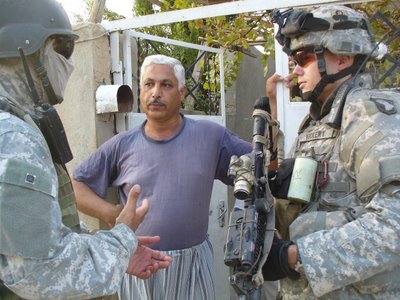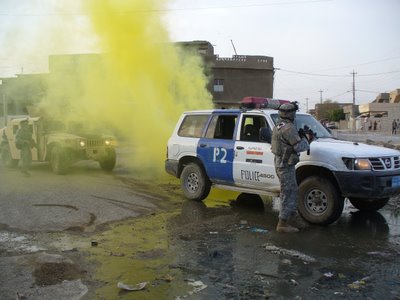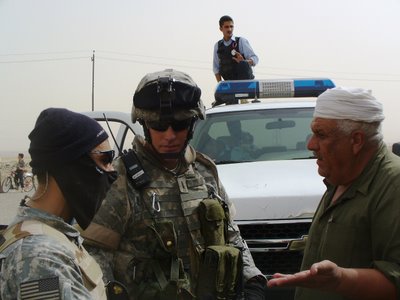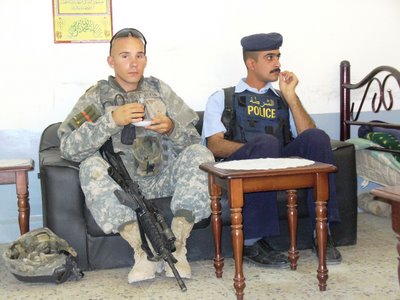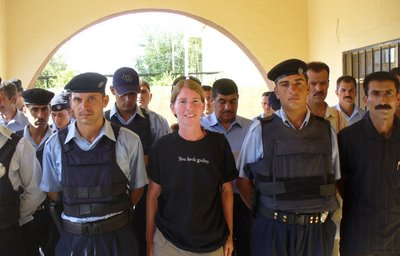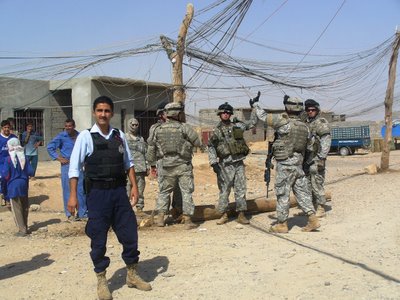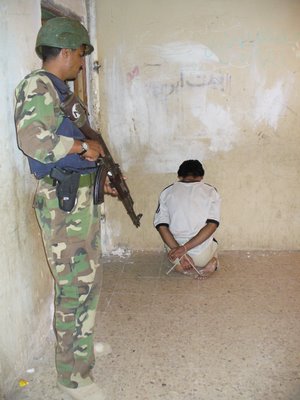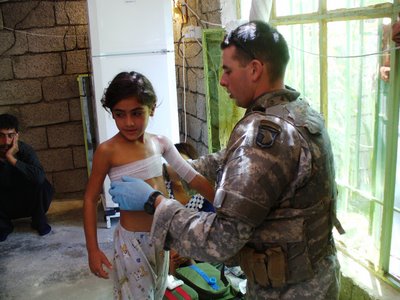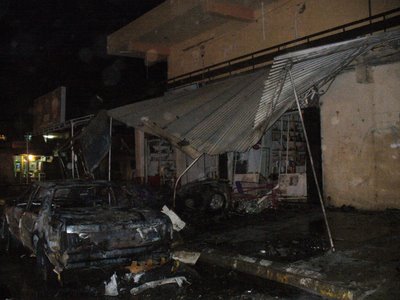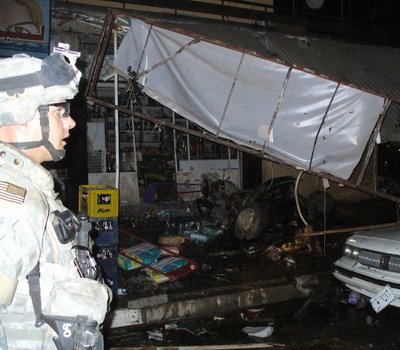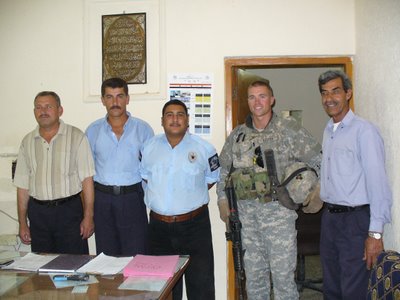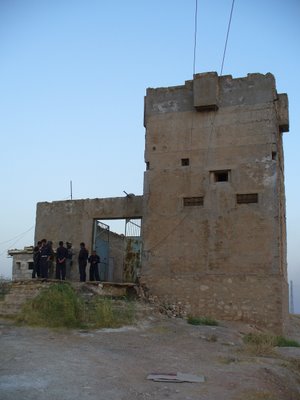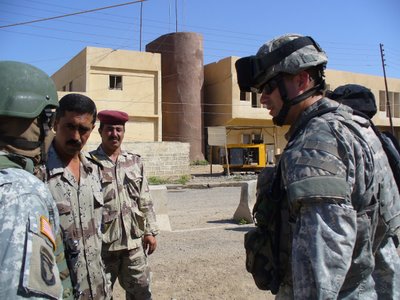Sunday, August 27, 2006
Saturday, August 26, 2006
Walking the Beat with Charlie Company August 26, 2006
Walking the Beat with Charlie Company
August 26, 2006
For the past several weeks, I have spent Friday or Saturday with the 101st Airborne Division’s Charlie Company, 2nd Battalion. Charlie Company has had a busy year. More raids, more sniper attacks, more shoot-outs have occurred in Charlie Company’s sector than in any other sector of the city of Kirkuk. With the end of their deployment drawing near, it would be understandable for the soldiers of Charlie Company to play it safe and stay in their trucks, but they are better than that. They continue to walk the beat, and that means I do too. Great.
Dismounted foot patrols in 120 plus degree heat are not much fun. Add heavy body armor, chilly stares, streams of sewage and garbage, and the only question that remains is why? Why endure so many levels of discomfort? While this does just seem to be part of the job description of a soldier, a foot patrol does have a purpose. Soldiers talk to local residents and shopkeepers and give them a chance to voice their concerns. They do not often seize this opportunity, however. Sometimes they complain—usually about the fuel shortage— but most of the time they tell the soldiers everything is fine. The soldiers know better. They know having raided countless houses, including some in the neighborhoods we walk, that there is trouble brewing behind many of the gates that line these streets. Having witnessed several raids, I know the targets our soldiers are after look no different than the people who give us the silent treatment during these patrols.
Is it possible to break the silence? After almost a year, it seems if people wanted to talk they would have by now. Maybe by saying everything is fine, they hope to make it so. Or maybe locals have resigned themselves to accepting certain realities that we would consider unacceptable. For instance, there is no city-wide waste removal system, so most residents simply throw their garbage into the nearest vacant lot or anywhere outside the walls of their property. There is no city-wide sewage system, so streams of human waste run from houses into channels in the street. Add these together and the smell can be difficult to endure and equally difficult to escape. But, because this is how it has always been, it is probably hard to imagine any other way.
Acts of violence, both targeted and random, have also become an accepted reality for many, or so it would seem. An innocent man may live next door to a terrorist, and know it, but consider it safer to remain silent than to share this information with soldiers. And though our soldiers want to make Kirkuk safe and secure, the residents of the city do not know these men who arrive in convoys of armored Humvees and always carry weapons. For this reason, many patrols are conducted jointly with Iraqi Police, but again the residents do not necessarily trust the police, so they stick to their story. Everything is fine.
If the soldiers could spend more time with the Iraqis they meet briefly while on patrol, it is likely they would win these people over. I have walked with many decent and affable soldiers from Charlie Company: John Vickery, Nathan Ryan, Donald Tarver, Josh Orban, Matt Somma, Daren Garis and Chris Miller, and the list goes on. They are easy to like. But just as the Iraqis feel it would be dangerous to let their guard down, so do the soldiers. They cannot leave their weapons and body armor in the trucks. They cannot stay in one place for too long. In some areas where there is limited cover from an attack, or where an attack is more likely to occur, they take extra precautions. A traffic circle was filled with a cloud of yellow smoke to obscure the soldiers from view. An open field was no place to linger.
War is generally thought of as a series of attacks and counterattacks, active and ever-changing, but here in Kirkuk it is sometimes anything but. Sometimes it is simply more of the same. The soldiers know the streets of the city better than they will ever know the people who live on them, and maybe this is how it has to be in a time of war. But maybe the Iraqis are watching even if they are not talking. Maybe they see the effort the soldiers are making to improve the situation in Kirkuk, and maybe they will try to do their part to help when they are ready to accept that everything is not fine. shelbymonroe@gmail.com
August 26, 2006
For the past several weeks, I have spent Friday or Saturday with the 101st Airborne Division’s Charlie Company, 2nd Battalion. Charlie Company has had a busy year. More raids, more sniper attacks, more shoot-outs have occurred in Charlie Company’s sector than in any other sector of the city of Kirkuk. With the end of their deployment drawing near, it would be understandable for the soldiers of Charlie Company to play it safe and stay in their trucks, but they are better than that. They continue to walk the beat, and that means I do too. Great.
Dismounted foot patrols in 120 plus degree heat are not much fun. Add heavy body armor, chilly stares, streams of sewage and garbage, and the only question that remains is why? Why endure so many levels of discomfort? While this does just seem to be part of the job description of a soldier, a foot patrol does have a purpose. Soldiers talk to local residents and shopkeepers and give them a chance to voice their concerns. They do not often seize this opportunity, however. Sometimes they complain—usually about the fuel shortage— but most of the time they tell the soldiers everything is fine. The soldiers know better. They know having raided countless houses, including some in the neighborhoods we walk, that there is trouble brewing behind many of the gates that line these streets. Having witnessed several raids, I know the targets our soldiers are after look no different than the people who give us the silent treatment during these patrols.
Is it possible to break the silence? After almost a year, it seems if people wanted to talk they would have by now. Maybe by saying everything is fine, they hope to make it so. Or maybe locals have resigned themselves to accepting certain realities that we would consider unacceptable. For instance, there is no city-wide waste removal system, so most residents simply throw their garbage into the nearest vacant lot or anywhere outside the walls of their property. There is no city-wide sewage system, so streams of human waste run from houses into channels in the street. Add these together and the smell can be difficult to endure and equally difficult to escape. But, because this is how it has always been, it is probably hard to imagine any other way.
Acts of violence, both targeted and random, have also become an accepted reality for many, or so it would seem. An innocent man may live next door to a terrorist, and know it, but consider it safer to remain silent than to share this information with soldiers. And though our soldiers want to make Kirkuk safe and secure, the residents of the city do not know these men who arrive in convoys of armored Humvees and always carry weapons. For this reason, many patrols are conducted jointly with Iraqi Police, but again the residents do not necessarily trust the police, so they stick to their story. Everything is fine.
If the soldiers could spend more time with the Iraqis they meet briefly while on patrol, it is likely they would win these people over. I have walked with many decent and affable soldiers from Charlie Company: John Vickery, Nathan Ryan, Donald Tarver, Josh Orban, Matt Somma, Daren Garis and Chris Miller, and the list goes on. They are easy to like. But just as the Iraqis feel it would be dangerous to let their guard down, so do the soldiers. They cannot leave their weapons and body armor in the trucks. They cannot stay in one place for too long. In some areas where there is limited cover from an attack, or where an attack is more likely to occur, they take extra precautions. A traffic circle was filled with a cloud of yellow smoke to obscure the soldiers from view. An open field was no place to linger.
War is generally thought of as a series of attacks and counterattacks, active and ever-changing, but here in Kirkuk it is sometimes anything but. Sometimes it is simply more of the same. The soldiers know the streets of the city better than they will ever know the people who live on them, and maybe this is how it has to be in a time of war. But maybe the Iraqis are watching even if they are not talking. Maybe they see the effort the soldiers are making to improve the situation in Kirkuk, and maybe they will try to do their part to help when they are ready to accept that everything is not fine. shelbymonroe@gmail.com
A Bravo Company Goodbye August 26, 2006
A Bravo Company Goodbye
August 26, 2006
Thousands of soldiers have spent a year away from their families and their friends in order to work on improving the situation for the people of Iraq. A year is a long time for a young soldier to be away from home. Many have spent as much or more time away from their wives and children as they have with them. And many soldiers have spent more time than they ever could have imagined with a network of Iraqi Forces during this yearlong deployment. Here in Kirkuk, where violence is not the order of the day every day, perhaps the soldiers have been luckier than they realize in the way they have been allowed to spend their time.
Sure, there is corruption on many levels throughout Iraq, and Kirkuk has its share of corrupt individuals in most of the offices and departments the soldiers deal with regularly. But there are good guys here too, and the men of the 101st Airborne Division’s Bravo Company, 1st Brigade, 2nd Battalion, have become their trusted and valued friends.
At the Arafa Police Station, where the soldiers have been served dinner and countless glasses of chai, there are good cops who see the soldiers almost every day, who trade jokes with them, and who rely on the soldiers in a way they cannot rely on members of their own police force. They are drawn to the soldiers and ask to have their picture taken with them. They know the soldiers appreciate their hard work, even if their countrymen do not.
Bravo Company also makes regular stops at the Emergency Response Unit (ERU) to make sure the cops are wearing their body armor and managing their weapons properly, and to listen to their concerns and make sure they have what they need to do their job. Once again, a handful of cops have risen to the surface and developed an attachment to the soldiers. Three policemen who flock to Sergeant Darren McQueen whenever he appears at ERU were conspicuously absent when he made the rounds recently. It looked like they were gone for the day when suddenly voices were heard coming from the jail cell on the premises. “Queen, Queen,” they called sadly. Darren walked up to a long, narrow window, and behind the bars were his IP friends, spending the day in jail because they had been late to work. He scolded them and made them laugh, and I am sure this was the highlight of their day.
It must be difficult to try to live and work with integrity at a time when integrity has no value. As important as it is for our soldiers to have allies among the Iraqi Forces, it may be even more critical for this noble and hardworking minority to have our support. They see our soldiers as their brothers in arms. They have met a new group of American soldiers every year since the war began, and I am sure they have worked well with all of them, but I cannot imagine they have ever had as much fun while doing their job as they have with their Bravo brothers. It will be very difficult for them to say goodbye to these soldiers.
It will not be as difficult for the soldiers to say goodbye; they cannot wait to get back to the United States. But they cannot just hop on a plane. There is work to be done to pave the way for their replacements, the 25th Infantry Division. For security reasons, the soldiers have not broadcast the exact date of their departure. Their Iraqi friends know they will be leaving soon, but they do not know how soon. The Bravo Company guys will bring the guys from the 25th out on patrols, and they will introduce them to the Iraqi Police, and they will all drink chai together, and they will share a laugh or two because the Bravo soldiers are funny and so are the cops. But there will be a certain amount of sadness in the air because the Iraqi Police know they have been in very good hands for the past year.
Bravo Company has also been in good hands. No convoy is complete without an interpreter, and there are several whom the soldiers have worked closely with and come to trust. A good interpreter is as important as any weapon in this war because so much of the soldiers’ work here involves words. The interpreters help the soldiers learn some basic Arabic and Kurdish phrases. And the soldiers teach the interpreters how to swear in English. Everybody wins. After a year of hanging on an interpreter’s every word, and vice versa, saying goodbye will not be so easy.
In addition to the working relationships that must come to an end, there are many relationships that have sprung up just because the soldiers are nice guys who make friends easily. There are children who have come to know many of the soldiers from their routine patrols through their neighborhoods. There is a little girl named Banaz who has been visited by the same group of soldiers many times over the past month. When they met her, she was shy and suffering from a bad burn. Now she lights up when she sees them, and her skin has almost completely healed. The kids know how it works. They know the soldiers cannot stay forever, but they will have a hard time accepting the fact that they will never see these guys again. How can I be so sure of this? Like the kids, I have had the privilege of getting to know the soldiers of Bravo Company, and I know how hard it will be for me to say goodbye to them. shelbymonroe@gmail.com
August 26, 2006
Thousands of soldiers have spent a year away from their families and their friends in order to work on improving the situation for the people of Iraq. A year is a long time for a young soldier to be away from home. Many have spent as much or more time away from their wives and children as they have with them. And many soldiers have spent more time than they ever could have imagined with a network of Iraqi Forces during this yearlong deployment. Here in Kirkuk, where violence is not the order of the day every day, perhaps the soldiers have been luckier than they realize in the way they have been allowed to spend their time.
Sure, there is corruption on many levels throughout Iraq, and Kirkuk has its share of corrupt individuals in most of the offices and departments the soldiers deal with regularly. But there are good guys here too, and the men of the 101st Airborne Division’s Bravo Company, 1st Brigade, 2nd Battalion, have become their trusted and valued friends.
At the Arafa Police Station, where the soldiers have been served dinner and countless glasses of chai, there are good cops who see the soldiers almost every day, who trade jokes with them, and who rely on the soldiers in a way they cannot rely on members of their own police force. They are drawn to the soldiers and ask to have their picture taken with them. They know the soldiers appreciate their hard work, even if their countrymen do not.
Bravo Company also makes regular stops at the Emergency Response Unit (ERU) to make sure the cops are wearing their body armor and managing their weapons properly, and to listen to their concerns and make sure they have what they need to do their job. Once again, a handful of cops have risen to the surface and developed an attachment to the soldiers. Three policemen who flock to Sergeant Darren McQueen whenever he appears at ERU were conspicuously absent when he made the rounds recently. It looked like they were gone for the day when suddenly voices were heard coming from the jail cell on the premises. “Queen, Queen,” they called sadly. Darren walked up to a long, narrow window, and behind the bars were his IP friends, spending the day in jail because they had been late to work. He scolded them and made them laugh, and I am sure this was the highlight of their day.
It must be difficult to try to live and work with integrity at a time when integrity has no value. As important as it is for our soldiers to have allies among the Iraqi Forces, it may be even more critical for this noble and hardworking minority to have our support. They see our soldiers as their brothers in arms. They have met a new group of American soldiers every year since the war began, and I am sure they have worked well with all of them, but I cannot imagine they have ever had as much fun while doing their job as they have with their Bravo brothers. It will be very difficult for them to say goodbye to these soldiers.
It will not be as difficult for the soldiers to say goodbye; they cannot wait to get back to the United States. But they cannot just hop on a plane. There is work to be done to pave the way for their replacements, the 25th Infantry Division. For security reasons, the soldiers have not broadcast the exact date of their departure. Their Iraqi friends know they will be leaving soon, but they do not know how soon. The Bravo Company guys will bring the guys from the 25th out on patrols, and they will introduce them to the Iraqi Police, and they will all drink chai together, and they will share a laugh or two because the Bravo soldiers are funny and so are the cops. But there will be a certain amount of sadness in the air because the Iraqi Police know they have been in very good hands for the past year.
Bravo Company has also been in good hands. No convoy is complete without an interpreter, and there are several whom the soldiers have worked closely with and come to trust. A good interpreter is as important as any weapon in this war because so much of the soldiers’ work here involves words. The interpreters help the soldiers learn some basic Arabic and Kurdish phrases. And the soldiers teach the interpreters how to swear in English. Everybody wins. After a year of hanging on an interpreter’s every word, and vice versa, saying goodbye will not be so easy.
In addition to the working relationships that must come to an end, there are many relationships that have sprung up just because the soldiers are nice guys who make friends easily. There are children who have come to know many of the soldiers from their routine patrols through their neighborhoods. There is a little girl named Banaz who has been visited by the same group of soldiers many times over the past month. When they met her, she was shy and suffering from a bad burn. Now she lights up when she sees them, and her skin has almost completely healed. The kids know how it works. They know the soldiers cannot stay forever, but they will have a hard time accepting the fact that they will never see these guys again. How can I be so sure of this? Like the kids, I have had the privilege of getting to know the soldiers of Bravo Company, and I know how hard it will be for me to say goodbye to them. shelbymonroe@gmail.com
Sunday, August 20, 2006
Saturday, August 19, 2006
Allies and Flies August 19, 2006
Allies and Flies
August 19, 2006
The war being fought in Kirkuk is a fairly quiet war. There may be the occasional explosion, or a burst of gunfire, but most days are filled with the sound of soldiers talking: to Iraqi Forces, to Iraqis in positions of power, and to Iraqis with no power, at least not outwardly. What do they talk about? You name it—soccer, the weather, volcanoes, poverty, college, wild boar hunting, television, good guys, bad guys. The purpose of every conversation is to build relationships, gather information, and collect intelligence. Intelligence comes from a variety of sources, and good intelligence makes it possible to catch bad guys, or to prevent bad things from happening.
Local leaders can be vital allies or flies in the ointment. The soldiers of the 101st Airborne Division serving in Kirkuk are well-acquainted with both allies and flies. A muktar, the man who oversees a neighborhood or community, should be a useful resource. He knows the people of his community; he knows who is content and who might be trouble. But what if the muktar himself is trouble?
The 2nd Battalion’s Bravo Company has a shifty muktar in their sector. We’ll call him Muktar T. He will serve the soldiers chai and chat pleasantly. And they will drink the chai because it would be rude not to, but they will not enjoy the conversation. The muktar might volunteer information about alleged bad guys in the neighborhood, but his information will be vague or out-of-date. Or he might feign ignorance about the activities of his people. Instead of having a useful friend who could provide a shortcut to peace, the soldiers have only an annoying buzzing in their ear. One more problem. One less solution.
A police chief should be another of our valued friends. Which brings us to one of Kirkuk’s police chiefs—Colonel E. Colonel E is a major fly. Lieutenant Erik Wright has met with Muktar T many times and with Colonel E many more. These meetings are a study in contrasts. On Erik’s side is integrity, decency, diplomacy. On the other side is trickery, dishonesty, and sometimes just plain stupidity.
One of the goals in Iraq has been to equip the Iraqi forces with protective gear. The Iraqi Police have been issued body armor, and they are supposed to wear it while out on patrol or on guard duty. They do not want to wear their vests. It does not matter that the IP are frequently targeted by insurgents. The vests make them hot and uncomfortable, and they would rather take their chances. Captain Casey Welch decided desperate times called for desperate measures. He had all of the televisions removed from the offices at the police station and placed in the custody of Colonel E, whose television was also removed, as he was ultimately responsible for enforcing the body armor policy. On a recent visit to Colonel E, Lieutenant Wright noticed the Colonel’s TV was back. He was watching cartoons. Erik asked if Captain Welch had lifted the TV ban. Colonel E said yes, two days ago. Before the day was out, Erik confirmed what he had suspected. The ban had not been lifted. Colonel E had lied to his face. Ridiculous? Yes. No one said Iraq wasn’t ridiculous.
It is hard to identify the enemy in the war in Iraq because he dresses in civilian clothes, or worse—he uses a uniform to disguise himself as one of the good guys. It is equally difficult to distinguish the good guys because they would prefer to remain anonymous. There are some good guys who are brave enough to wear the uniform of the Iraqi Police or Army and serve as an example for others to follow. Our soldiers value all of the people willing to work with us, and when they talk we listen.
Bravo Company recently conducted a raid on an apartment complex in Kirkuk. Acting on intelligence gathered from numerous sources, the soldiers worked together with Iraqi Forces from the Emergency Services Unit (ESU) to pick up several individuals suspected of working against us, against the Iraqis who want stability in their country. The soldiers enjoy a raid. Who can blame them? It is far easier to remove a bad guy from the street than to sit across the room from one and try to carry on a polite conversation.
The raid took place in the early morning hours. Carefully choreographed, the plan involved several teams fanning out among the darkened buildings, running through lots covered with garbage, breathing air that really shouldn’t be breathed, and finally storming apartments and apprehending suspects. Only one on the list of suspects could not be found. The rest were rounded up and brought to ESU for questioning.
For every insurgent or terrorist who is arrested, the level of security in Kirkuk increases. For every corrupt individual in a position of power, the level of security decreases. Bravo Company is working on a new list of suspects, and there will be some familiar faces on it. Flies do tend to thrive in Iraq, but they can be dealt with. Together with our Iraqi friends, the soldiers of Bravo Company have worked to rid Kirkuk of as many pests as possible, and they will continue to talk to people, to add to their list of allies, to eliminate more flies. shelbymonroe@gmail.com
August 19, 2006
The war being fought in Kirkuk is a fairly quiet war. There may be the occasional explosion, or a burst of gunfire, but most days are filled with the sound of soldiers talking: to Iraqi Forces, to Iraqis in positions of power, and to Iraqis with no power, at least not outwardly. What do they talk about? You name it—soccer, the weather, volcanoes, poverty, college, wild boar hunting, television, good guys, bad guys. The purpose of every conversation is to build relationships, gather information, and collect intelligence. Intelligence comes from a variety of sources, and good intelligence makes it possible to catch bad guys, or to prevent bad things from happening.
Local leaders can be vital allies or flies in the ointment. The soldiers of the 101st Airborne Division serving in Kirkuk are well-acquainted with both allies and flies. A muktar, the man who oversees a neighborhood or community, should be a useful resource. He knows the people of his community; he knows who is content and who might be trouble. But what if the muktar himself is trouble?
The 2nd Battalion’s Bravo Company has a shifty muktar in their sector. We’ll call him Muktar T. He will serve the soldiers chai and chat pleasantly. And they will drink the chai because it would be rude not to, but they will not enjoy the conversation. The muktar might volunteer information about alleged bad guys in the neighborhood, but his information will be vague or out-of-date. Or he might feign ignorance about the activities of his people. Instead of having a useful friend who could provide a shortcut to peace, the soldiers have only an annoying buzzing in their ear. One more problem. One less solution.
A police chief should be another of our valued friends. Which brings us to one of Kirkuk’s police chiefs—Colonel E. Colonel E is a major fly. Lieutenant Erik Wright has met with Muktar T many times and with Colonel E many more. These meetings are a study in contrasts. On Erik’s side is integrity, decency, diplomacy. On the other side is trickery, dishonesty, and sometimes just plain stupidity.
One of the goals in Iraq has been to equip the Iraqi forces with protective gear. The Iraqi Police have been issued body armor, and they are supposed to wear it while out on patrol or on guard duty. They do not want to wear their vests. It does not matter that the IP are frequently targeted by insurgents. The vests make them hot and uncomfortable, and they would rather take their chances. Captain Casey Welch decided desperate times called for desperate measures. He had all of the televisions removed from the offices at the police station and placed in the custody of Colonel E, whose television was also removed, as he was ultimately responsible for enforcing the body armor policy. On a recent visit to Colonel E, Lieutenant Wright noticed the Colonel’s TV was back. He was watching cartoons. Erik asked if Captain Welch had lifted the TV ban. Colonel E said yes, two days ago. Before the day was out, Erik confirmed what he had suspected. The ban had not been lifted. Colonel E had lied to his face. Ridiculous? Yes. No one said Iraq wasn’t ridiculous.
It is hard to identify the enemy in the war in Iraq because he dresses in civilian clothes, or worse—he uses a uniform to disguise himself as one of the good guys. It is equally difficult to distinguish the good guys because they would prefer to remain anonymous. There are some good guys who are brave enough to wear the uniform of the Iraqi Police or Army and serve as an example for others to follow. Our soldiers value all of the people willing to work with us, and when they talk we listen.
Bravo Company recently conducted a raid on an apartment complex in Kirkuk. Acting on intelligence gathered from numerous sources, the soldiers worked together with Iraqi Forces from the Emergency Services Unit (ESU) to pick up several individuals suspected of working against us, against the Iraqis who want stability in their country. The soldiers enjoy a raid. Who can blame them? It is far easier to remove a bad guy from the street than to sit across the room from one and try to carry on a polite conversation.
The raid took place in the early morning hours. Carefully choreographed, the plan involved several teams fanning out among the darkened buildings, running through lots covered with garbage, breathing air that really shouldn’t be breathed, and finally storming apartments and apprehending suspects. Only one on the list of suspects could not be found. The rest were rounded up and brought to ESU for questioning.
For every insurgent or terrorist who is arrested, the level of security in Kirkuk increases. For every corrupt individual in a position of power, the level of security decreases. Bravo Company is working on a new list of suspects, and there will be some familiar faces on it. Flies do tend to thrive in Iraq, but they can be dealt with. Together with our Iraqi friends, the soldiers of Bravo Company have worked to rid Kirkuk of as many pests as possible, and they will continue to talk to people, to add to their list of allies, to eliminate more flies. shelbymonroe@gmail.com
Thursday, August 17, 2006
Tuesday, August 15, 2006
Sunday, August 13, 2006
That's So Bravo! August 13,2006
That’s So Bravo!
August 13, 2006
For the soldiers of the 101st Airborne Division, who are nearing the end of their deployment here in Iraq, one day is not so different from another. At this point, nothing is new. Many faces are familiar. The soldiers of the 2nd Battalion’s Bravo Company continue to carry out missions with the same diligence, the same attention to detail as always, but they know what they can expect to find at every stop along the way. For the soldiers, a day in Kirkuk can be pretty mundane. For the reporter riding along with them, however, it is always entertaining.
I do not know how many missions and patrols I went on with Bravo Company this week. The days ran together; missions that began late one night ended early the next morning. There was talk of giving me a weapon because I was always around. It made sense to put me to work. Being around the same group of guys all the time gave me a better idea of the nature of their work, which can be very frustrating and tiresome, and a better idea of how they manage to rise above all of this. It takes a sense of humor and a lot of heart, which is the definition of Bravo Company.
One of the ongoing struggles in Kirkuk involves gas lines. Gas is in short supply, and lines at the gas stations are frequently blocks long. The Iraqi police watch over these lines, but occasionally they become overwhelmed, or just tired of being yelled at, so they call in Coalition Forces to help settle things down, making the soldiers feel a bit like bouncers. Highly trained bouncers. On one such call to an unruly line of motorists, the job was as simple as telling people where they could and could not park. And then waiting to make sure they moved their cars. Though the people in the gas lines are impatient, they are generally harmless. But a large crowd combined with a group of soldiers presents a tempting target to a terrorist or insurgent, so Sergeants Eric Caudill and Gary Cunningham pulled security, which meant keeping a careful watch over the area, and joking around with the kids who surrounded them. I don’t know if a soldier’s training involves interacting with kids, but these guys are good at it. They have seen some of the kids many times before, and a rapport has developed that is probably unique to this setting, which in itself is just plain weird. The kids have picked up English from the soldiers and television, and they sound a little bit like extras from The Sopranos.
Another day brought another mission, this time a cordon and knock led by Iraqi Forces (and which required convening with them at 3:00 A.M. for final preparations). I was placed under the watchful eye of Sergeant Darren McQueen. With several Red Bulls under his belt, Darren had more energy than most during this early morning mission. In addition to carrying out his regular duties and keeping me safe, he also wanted to pet a cow before the day was done. The cows fled.
A cordon and knock mission is usually, well, boring. Except for Darren’s cow chase, this one was no different. The mission proceeded smoothly enough, Iraqi Forces working their way from block to block, marking each searched house with a yellow ribbon. Our soldiers thought perhaps the yellow ribbons were meant for them, and maybe in some way they were. The Iraqis did most of the work with the American soldiers playing a supporting role, and a minor one at that, making it possible to envision a day when our help might no longer be necessary.
This week with Bravo Company had everything, but, more than anything, it had comedy. A shift leader at the Arafa Police Station, one the Bravo Company soldiers work with regularly, had been after the soldiers to come for dinner one night. A kind offer, but he may not have known what he was getting himself into. We arrived at the station on the appointed night to find several Iraqi policemen transforming the office into a dining room. About ten soldiers piled into the room, relieving themselves of their body armor and anxiously awaiting their meal. Large bowls of soup, a rice dish called biryani, salad and bread were placed around the table. Clearly, our host understood the appetite of the American soldier. Yes, there were contests to see who could eat the most. And though chai is customarily served after a meal, these soldiers were not content to wait. Sergeant Mike Jones poured, and the tray of tiny glasses went down the table full, then back empty many times. Sergeant Robert Turner drank chai as though his life depended on it. Our Iraqi friends laughed at the savage display, but hopefully they understood all of this fun was thanks to them and their generosity.
In addition to the tedious nature of the gas station visit, the orderly nature of the cordon and search mission, and the slightly chaotic nature of the dinner at the police station, there were missions that involved far fewer players, but which were no less significant. Two of these missions involved one little girl named Banaz, who had been badly burned by a pot of boiling water and needed medical attention. Reluctant to take her to the hospital, her mother brought the situation to the attention of the soldiers, who were in the area on patrol. The soldiers returned with Medic David Jette, and, as always, I tagged along.
The burns covered a large part of the little girl’s chest and left arm, and a portion of her face. She was in a lot of pain and needed treatment before infection set in. David very methodically began to clean the affected area, gently wiping away dead skin, while Banaz did her best to stand up to the pain. Every time she cried out, the soldiers’ sympathy and respect for her grew. After dressing the wound, David gave instructions on how to care for it until we returned.
Two days later, we went back to see how Banaz was doing. David carefully removed the bandages and repeated the process of cleaning the area of the burn, which already showed signs of healing. Once again, Banaz impressed us with her bravery. Sergeants Mike Jones and Jeremy Stearns took turns holding her hand, and Lieutenant Erik Wright took pictures of the poignant scene. We gave Banaz presents, and she hugged the soldiers. It is hard to imagine how it would feel to be in her shoes, suddenly the focus of so much attention and affection from men in uniform, loaded down with body armor. I am sure Banaz will always have a place in her heart for these guys, just as they will always have a place in theirs for her.
Sometimes it seems as though Kirkuk is all right. When nothing explodes for a few days, when Iraqi Forces work alongside ours, when we break bread and share a laugh or a tear with our Iraqi friends, it is possible to imagine a kind of calm could settle here. The soldiers of Bravo Company do everything in their power to give peace a chance, even as they count the days until they can go home. Often their job requires a certain amount of firmness as they train Iraqi Forces to function independently and bring security to the city. But there is a lot more to these guys than meets the eye. The children of Iraq see a side of the soldiers that doesn’t often make it onto the evening news. Though the soldiers will insist they are tough guys, the kids know better. A little girl named Banaz knows what I am talking about. She knows Bravo. shelbymonroe@gmail.com
August 13, 2006
For the soldiers of the 101st Airborne Division, who are nearing the end of their deployment here in Iraq, one day is not so different from another. At this point, nothing is new. Many faces are familiar. The soldiers of the 2nd Battalion’s Bravo Company continue to carry out missions with the same diligence, the same attention to detail as always, but they know what they can expect to find at every stop along the way. For the soldiers, a day in Kirkuk can be pretty mundane. For the reporter riding along with them, however, it is always entertaining.
I do not know how many missions and patrols I went on with Bravo Company this week. The days ran together; missions that began late one night ended early the next morning. There was talk of giving me a weapon because I was always around. It made sense to put me to work. Being around the same group of guys all the time gave me a better idea of the nature of their work, which can be very frustrating and tiresome, and a better idea of how they manage to rise above all of this. It takes a sense of humor and a lot of heart, which is the definition of Bravo Company.
One of the ongoing struggles in Kirkuk involves gas lines. Gas is in short supply, and lines at the gas stations are frequently blocks long. The Iraqi police watch over these lines, but occasionally they become overwhelmed, or just tired of being yelled at, so they call in Coalition Forces to help settle things down, making the soldiers feel a bit like bouncers. Highly trained bouncers. On one such call to an unruly line of motorists, the job was as simple as telling people where they could and could not park. And then waiting to make sure they moved their cars. Though the people in the gas lines are impatient, they are generally harmless. But a large crowd combined with a group of soldiers presents a tempting target to a terrorist or insurgent, so Sergeants Eric Caudill and Gary Cunningham pulled security, which meant keeping a careful watch over the area, and joking around with the kids who surrounded them. I don’t know if a soldier’s training involves interacting with kids, but these guys are good at it. They have seen some of the kids many times before, and a rapport has developed that is probably unique to this setting, which in itself is just plain weird. The kids have picked up English from the soldiers and television, and they sound a little bit like extras from The Sopranos.
Another day brought another mission, this time a cordon and knock led by Iraqi Forces (and which required convening with them at 3:00 A.M. for final preparations). I was placed under the watchful eye of Sergeant Darren McQueen. With several Red Bulls under his belt, Darren had more energy than most during this early morning mission. In addition to carrying out his regular duties and keeping me safe, he also wanted to pet a cow before the day was done. The cows fled.
A cordon and knock mission is usually, well, boring. Except for Darren’s cow chase, this one was no different. The mission proceeded smoothly enough, Iraqi Forces working their way from block to block, marking each searched house with a yellow ribbon. Our soldiers thought perhaps the yellow ribbons were meant for them, and maybe in some way they were. The Iraqis did most of the work with the American soldiers playing a supporting role, and a minor one at that, making it possible to envision a day when our help might no longer be necessary.
This week with Bravo Company had everything, but, more than anything, it had comedy. A shift leader at the Arafa Police Station, one the Bravo Company soldiers work with regularly, had been after the soldiers to come for dinner one night. A kind offer, but he may not have known what he was getting himself into. We arrived at the station on the appointed night to find several Iraqi policemen transforming the office into a dining room. About ten soldiers piled into the room, relieving themselves of their body armor and anxiously awaiting their meal. Large bowls of soup, a rice dish called biryani, salad and bread were placed around the table. Clearly, our host understood the appetite of the American soldier. Yes, there were contests to see who could eat the most. And though chai is customarily served after a meal, these soldiers were not content to wait. Sergeant Mike Jones poured, and the tray of tiny glasses went down the table full, then back empty many times. Sergeant Robert Turner drank chai as though his life depended on it. Our Iraqi friends laughed at the savage display, but hopefully they understood all of this fun was thanks to them and their generosity.
In addition to the tedious nature of the gas station visit, the orderly nature of the cordon and search mission, and the slightly chaotic nature of the dinner at the police station, there were missions that involved far fewer players, but which were no less significant. Two of these missions involved one little girl named Banaz, who had been badly burned by a pot of boiling water and needed medical attention. Reluctant to take her to the hospital, her mother brought the situation to the attention of the soldiers, who were in the area on patrol. The soldiers returned with Medic David Jette, and, as always, I tagged along.
The burns covered a large part of the little girl’s chest and left arm, and a portion of her face. She was in a lot of pain and needed treatment before infection set in. David very methodically began to clean the affected area, gently wiping away dead skin, while Banaz did her best to stand up to the pain. Every time she cried out, the soldiers’ sympathy and respect for her grew. After dressing the wound, David gave instructions on how to care for it until we returned.
Two days later, we went back to see how Banaz was doing. David carefully removed the bandages and repeated the process of cleaning the area of the burn, which already showed signs of healing. Once again, Banaz impressed us with her bravery. Sergeants Mike Jones and Jeremy Stearns took turns holding her hand, and Lieutenant Erik Wright took pictures of the poignant scene. We gave Banaz presents, and she hugged the soldiers. It is hard to imagine how it would feel to be in her shoes, suddenly the focus of so much attention and affection from men in uniform, loaded down with body armor. I am sure Banaz will always have a place in her heart for these guys, just as they will always have a place in theirs for her.
Sometimes it seems as though Kirkuk is all right. When nothing explodes for a few days, when Iraqi Forces work alongside ours, when we break bread and share a laugh or a tear with our Iraqi friends, it is possible to imagine a kind of calm could settle here. The soldiers of Bravo Company do everything in their power to give peace a chance, even as they count the days until they can go home. Often their job requires a certain amount of firmness as they train Iraqi Forces to function independently and bring security to the city. But there is a lot more to these guys than meets the eye. The children of Iraq see a side of the soldiers that doesn’t often make it onto the evening news. Though the soldiers will insist they are tough guys, the kids know better. A little girl named Banaz knows what I am talking about. She knows Bravo. shelbymonroe@gmail.com
Sunday, August 06, 2006
Saturday, August 05, 2006
The Cost of Doing Business August 6, 2006
The Cost of Doing Business
August 6, 2006
The city of Kirkuk is considered relatively safe. Like any other city, it has its good neighborhoods and its bad neighborhoods. Unfortunately, insurgent or terrorist-led violence can turn any neighborhood bad in a matter of seconds.
The soldiers of the 101st Airborne Division’s Bravo Company, 2nd Battalion, know their sector well. They have traveled its streets on foot and in Humvees for almost a year now. The soldiers know which Iraqi Police (IP) they trust. They know which muktars they would like to bust. In Arafa, a section of the city that falls under the watch of Bravo Company’s 2nd Platoon, the soldiers even have a favorite market, located right across the street from the Arafa Police Station. The market is closed now.
One night, on a routine patrol with Bravo’s 2nd Platoon, our convoy responded to a report of gunshots being fired. Our patrol was being conducted jointly with members of the IP, who received the call and led the way to the possible crime scene. Our soldiers know how the IP like to drive, usually fast and recklessly, and they know the shortcuts leading from one part of the city to another. It only took seconds for them to notice the IP were taking a longer route, a route that led us past the soldiers’ favorite market, and they were driving rather slowly. Sergeant Ned Healy, often in charge of keeping Miss Shelby safe, commented on the amount of people gathered in the area. Crowds collect in marketplaces throughout the city, and usually they conduct their business and make it home safely, but crowds always seem vulnerable. Soldiers are always told to spread out on foot patrols. Too many people in one place can present too tempting a target.
When we arrived at the site where the shots had been reported, there was nothing going on. Moments later, a car bomb exploded in front of the 2nd Platoon’s favorite market. Car bombs, also known as VBIEDs (Vehicle Borne Improvised Explosive Devices), have become a popular weapon and can do a great deal of damage. We rushed back to the market area, the soldiers dreading what they might find. The storefronts had been destroyed, along with three cars in the vicinity. The husk of the car that had been turned into a bomb sat on the sidewalk in front of the shops. A gravely wounded motorist was treated but later died, and another civilian was killed at the scene. The soldiers were heartsick. This had been their neighborhood.
While they worked to secure the area, the soldiers also scrambled to find the owner of their favorite store. He was located, and Sergeant Brian Blake, our patrol leader, along with the other concerned soldiers, was clearly relieved to see that he had survived. His head was bandaged, and he had lost his shoes, but he wanted to make his way through the broken glass, the twisted pieces of metal and unidentifiable debris, to survey the damage to his store and retrieve the money from the cash register. The soldiers offered to go in for him, not wanting him to risk further injury, but he insisted, so they borrowed some shoes from an Iraqi policeman and helped him make his way through the wreckage.
It is possible to view the aftermath of an explosion, whether caused by an IED or a VBIED, with a certain amount of detachment. There is so much about these attacks that does not make sense. There is too much to absorb. But when the soldiers from Bravo Company saw what remained of their market, they were affected almost as if they had been caught in the explosion. Brian, Ned, gunner Joe Morton, and our driver Chris Myers began speculating. They could not help but wonder if the bomb had been meant for them, or if they had drawn attention to the market by being regular customers. They wondered if the IP had been involved, had deliberately led them through that area earlier.
After we arrived back at the base, the soldiers were anxious to replay the events of the night, hoping to make some sense of what had happened. Lieutenant Erik Wright led the discussion, and everybody weighed in. The soldiers have responded to enough explosions now that they know where they need to be and what they need to do. But because this explosion had hit so close to home, they could not accept that they had done all they could. They wanted to turn back the clock and prevent the explosion from ever happening.
It is impossible to undo what has been done. It is impossible to understand how random and devastating acts of violence could ever be justified. The VBIED at the marketplace could have been much worse, though not for the victims who died that day or their families. As much as the soldiers would love to prevent every explosion that takes place in the city, they cannot be everywhere, and they have learned that maybe it is best not to be anywhere too often. The soldiers of Bravo Company’s 2nd Platoon have added the image of their favorite market destroyed to the countless images of destruction that every soldier carries in his head. And their patrols have grown more complicated, as they try to avoid following the same route twice, and wonder where to take their business now. shelbymonroe@gmail.com
August 6, 2006
The city of Kirkuk is considered relatively safe. Like any other city, it has its good neighborhoods and its bad neighborhoods. Unfortunately, insurgent or terrorist-led violence can turn any neighborhood bad in a matter of seconds.
The soldiers of the 101st Airborne Division’s Bravo Company, 2nd Battalion, know their sector well. They have traveled its streets on foot and in Humvees for almost a year now. The soldiers know which Iraqi Police (IP) they trust. They know which muktars they would like to bust. In Arafa, a section of the city that falls under the watch of Bravo Company’s 2nd Platoon, the soldiers even have a favorite market, located right across the street from the Arafa Police Station. The market is closed now.
One night, on a routine patrol with Bravo’s 2nd Platoon, our convoy responded to a report of gunshots being fired. Our patrol was being conducted jointly with members of the IP, who received the call and led the way to the possible crime scene. Our soldiers know how the IP like to drive, usually fast and recklessly, and they know the shortcuts leading from one part of the city to another. It only took seconds for them to notice the IP were taking a longer route, a route that led us past the soldiers’ favorite market, and they were driving rather slowly. Sergeant Ned Healy, often in charge of keeping Miss Shelby safe, commented on the amount of people gathered in the area. Crowds collect in marketplaces throughout the city, and usually they conduct their business and make it home safely, but crowds always seem vulnerable. Soldiers are always told to spread out on foot patrols. Too many people in one place can present too tempting a target.
When we arrived at the site where the shots had been reported, there was nothing going on. Moments later, a car bomb exploded in front of the 2nd Platoon’s favorite market. Car bombs, also known as VBIEDs (Vehicle Borne Improvised Explosive Devices), have become a popular weapon and can do a great deal of damage. We rushed back to the market area, the soldiers dreading what they might find. The storefronts had been destroyed, along with three cars in the vicinity. The husk of the car that had been turned into a bomb sat on the sidewalk in front of the shops. A gravely wounded motorist was treated but later died, and another civilian was killed at the scene. The soldiers were heartsick. This had been their neighborhood.
While they worked to secure the area, the soldiers also scrambled to find the owner of their favorite store. He was located, and Sergeant Brian Blake, our patrol leader, along with the other concerned soldiers, was clearly relieved to see that he had survived. His head was bandaged, and he had lost his shoes, but he wanted to make his way through the broken glass, the twisted pieces of metal and unidentifiable debris, to survey the damage to his store and retrieve the money from the cash register. The soldiers offered to go in for him, not wanting him to risk further injury, but he insisted, so they borrowed some shoes from an Iraqi policeman and helped him make his way through the wreckage.
It is possible to view the aftermath of an explosion, whether caused by an IED or a VBIED, with a certain amount of detachment. There is so much about these attacks that does not make sense. There is too much to absorb. But when the soldiers from Bravo Company saw what remained of their market, they were affected almost as if they had been caught in the explosion. Brian, Ned, gunner Joe Morton, and our driver Chris Myers began speculating. They could not help but wonder if the bomb had been meant for them, or if they had drawn attention to the market by being regular customers. They wondered if the IP had been involved, had deliberately led them through that area earlier.
After we arrived back at the base, the soldiers were anxious to replay the events of the night, hoping to make some sense of what had happened. Lieutenant Erik Wright led the discussion, and everybody weighed in. The soldiers have responded to enough explosions now that they know where they need to be and what they need to do. But because this explosion had hit so close to home, they could not accept that they had done all they could. They wanted to turn back the clock and prevent the explosion from ever happening.
It is impossible to undo what has been done. It is impossible to understand how random and devastating acts of violence could ever be justified. The VBIED at the marketplace could have been much worse, though not for the victims who died that day or their families. As much as the soldiers would love to prevent every explosion that takes place in the city, they cannot be everywhere, and they have learned that maybe it is best not to be anywhere too often. The soldiers of Bravo Company’s 2nd Platoon have added the image of their favorite market destroyed to the countless images of destruction that every soldier carries in his head. And their patrols have grown more complicated, as they try to avoid following the same route twice, and wonder where to take their business now. shelbymonroe@gmail.com
